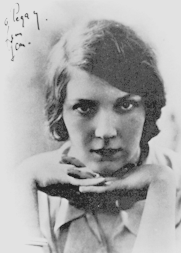|
 |
 |
 |
| Jean Rhys |
| ��� |
| �Ϥ��ӷ��Ghttp://www.syx.com/pilgrim/rag/html/rhys.html |
| �D�n�����GNovel |
| ��ƴ��Ѫ̡GKate Liu (�B����); Pin-chia Feng (���~��) |
| ����r���GWorld Literature in English;
Caribbean Literature |
|
|
|
|
�@
1890-1979
|
|
�@
|
|
�@
|
 Biography Biography
 Rhys's Self-Identity as a Creole Writer Rhys's Self-Identity as a Creole Writer
 Female Creole Identities Female Creole Identities
 Caribbean Culture Caribbean Culture
|
| �@ |
|
�@
|
 Biography Biography |
| |
Jean Rhys (mainly from the World of Penguin)
-
creole identity and a drifting life: Jean Rhys was born in Dominica in 1890, the daughter of a Welsh doctor and a white Creole mother. She came to England when she was sixteen and then drifted into a series of jobs - chorus girl, mannequin, artist's model - after her father died.
-
Start to write in her thirties: She began to write when the first of her three marriages broke up. She was in her thirties by then, and living in Paris, where she was encouraged by Ford Madox Ford, who also discovered D. H. Lawrence. Ford wrote an enthusiastic introduction to her first book in 1927, a collection of stories called The Left Bank. This was followed by Quartet (originally Postures, 1928), After Leaving Mr Mackenzie (1930), Voyage in the Dark (1934) and Good Morning, Midnight (1939). None of these books was particularly successful, perhaps because they were decades ahead of their time in theme and tone, dealing as they did with women as underdogs, exploited and exploiting their sexuality.
-
Characters a self-reflection of Rhys? Her first four novels are said to portray the same woman (with different names and minor details) at different stages of life, all drifting, unhappy, unstable, but with clear self-knowledge and understanding of others.
-
With the outbreak of war and subsequent failure of Good Morning, Midnight, the books went out of print and Jean Rhys literally dropped completely from sight. It was generally thought that she was dead. Nearly twenty years later she was rediscovered, largely due to the enthusiasm of the writer Francis Wyndham. She was living reclusively in Cornwall, and during those years had accumulated the stories collected in Tigers are Better-Looking. In 1966 she made a sensational reappearance with Wide Sargasso Sea, which won the Royal Society of Literature Award and the W. H.Smith Award in 1966, her only comment on the latter being that 'It has come too late'. . . . She was made a Fellow of the Royal Society of Literature in 1966 and a CBE in 1978.
Jean Rhys, described by A. Alvarez as 'one of the finest British writers of this century', died in 1979.
(from fiction rag)
Her style "Rhys often wrote about women-- in various stages of their lives -- living hand to mouth in London or Paris. The women are always on the economic edge, needing money, receiving cash and clothes from men, drinking, sitting in cafes, and endlessly walking. The books are very spare, stark, unsentimental, and wonderful."
TOP
�@
|
|
 Rhys's Self-Identity as a creole writer Rhys's Self-Identity as a creole writer
|
| |
Rhys's ambivalent Self-Identity
I.
"Do you consider yourself a West Indian?"
She shrugged. "It was such a long time ago when I left."
"So you don't think of yourself as a West Indian writer?"
Again she shrugged, but said nothing.
"What about English? Do you consider yourself an English writer?"
"No! I'm not, I'm not! I'm not even English."
"What about a French writer?" I asked.
Again she shrugged and said nothing.
"You have no desire to go back to Dominca?"
"Sometimes," she said.
David Plante. "Jean Rhys: A Remembrance"(275-76). Qut in Gregg: 1.
II. "I don't belong anywhere but I get very worked up about the West Indies. I still care. . . ."
III. After reading a critique of Wide Sargarso Sea. . ., Rhys complains. . . : "Again I am in danger of really becoming a recruit. . .I think being born in the West Indies is an influence very strong but . . .." (Gregg 2 underline added)
TOP
|
 Female Creole Identities Female Creole Identities |
| |
Jean Rhys as a creole writer--
Creole writer
Europeans born or living in the West Indies, educated to conceive of England as "home," they were also culturally marked and excluded as inferior colonials. At the same time, they were racially and institutionally privileged in relation to the African people who existed as bound labor and subalterns....
Toward the metropolitan Subject, the Creole often articulates a position of liminality and a poetics of ressentiment.
Toward the West Indian mulatto and Black Others, the Creole demonstrates a sense of proprietorship that allows for the appropriation and recruitment of "race" as an accessory of power and a trope of otherness.
TOP
|
| |
�@ |
| �@ |
|
|
|
|
